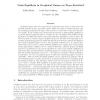ATAL
2010
Springer
13 years 5 months ago
2010
Springer
We consider the computational complexity of pure Nash equilibria in graphical games. It is known that the problem is NP-complete in general, but tractable (i.e., in P) for special...
SIGECOM
2003
ACM
13 years 9 months ago
2003
ACM
We examine correlated equilibria in the recently introduced formalism of graphical games, a succinct representation for multiplayer games. We establish a natural and powerful rela...
SIGECOM
2006
ACM
13 years 10 months ago
2006
ACM
We present a reduction from graphical games to Markov random fields so that pure Nash equilibria in the former can be found by statistical inference on the latter. Our result, wh...
SIGECOM
2006
ACM
13 years 10 months ago
2006
ACM
Graphical games have been proposed as a game-theoretic model of large-scale distributed networks of non-cooperative agents. When the number of players is large, and the underlying...
CSCLP
2007
Springer
13 years 10 months ago
2007
Springer
The notion of optimality naturally arises in many areas of applied mathematics and computer science concerned with decision making. Here we consider this notion in the context of ...
ICALP
2009
Springer
14 years 4 months ago
2009
Springer
We consider graphical games in which edges are zero-sum games between the endpoints/players; the payoff of a player is the sum of the payoffs from each incident edge. We give a si...


